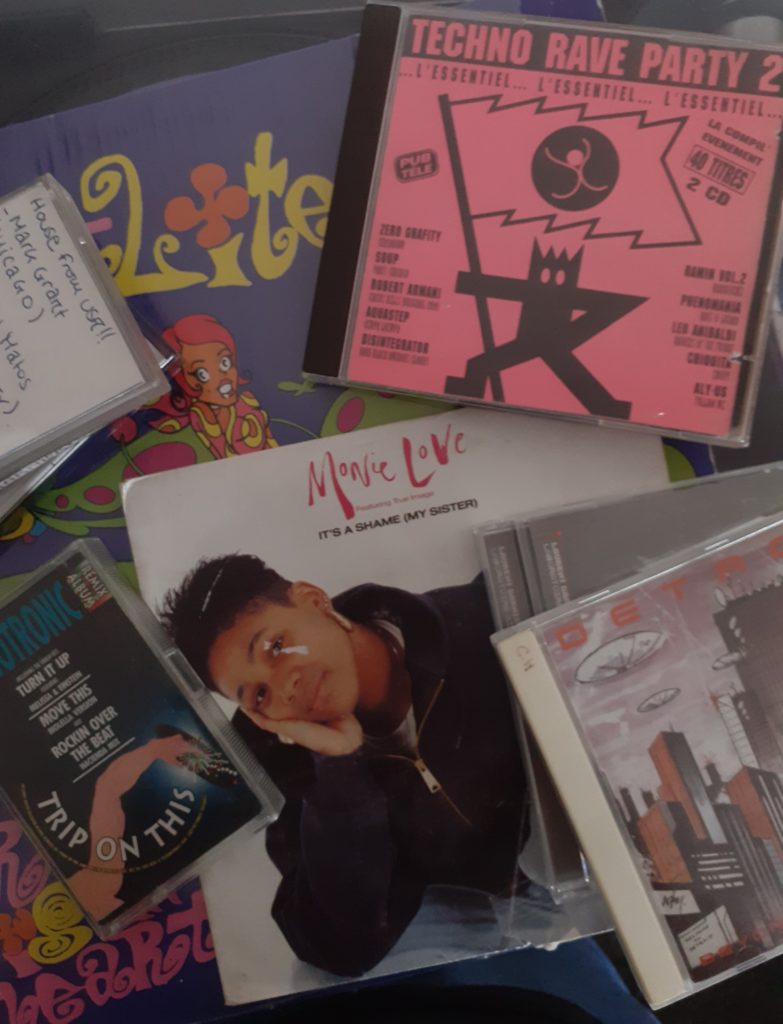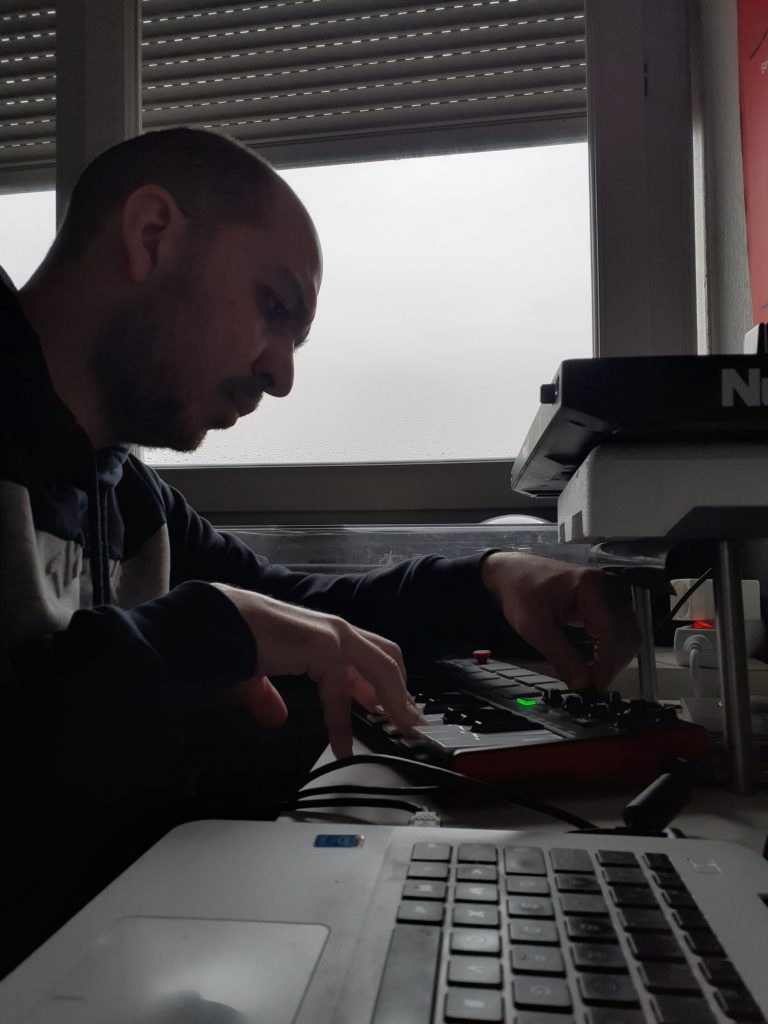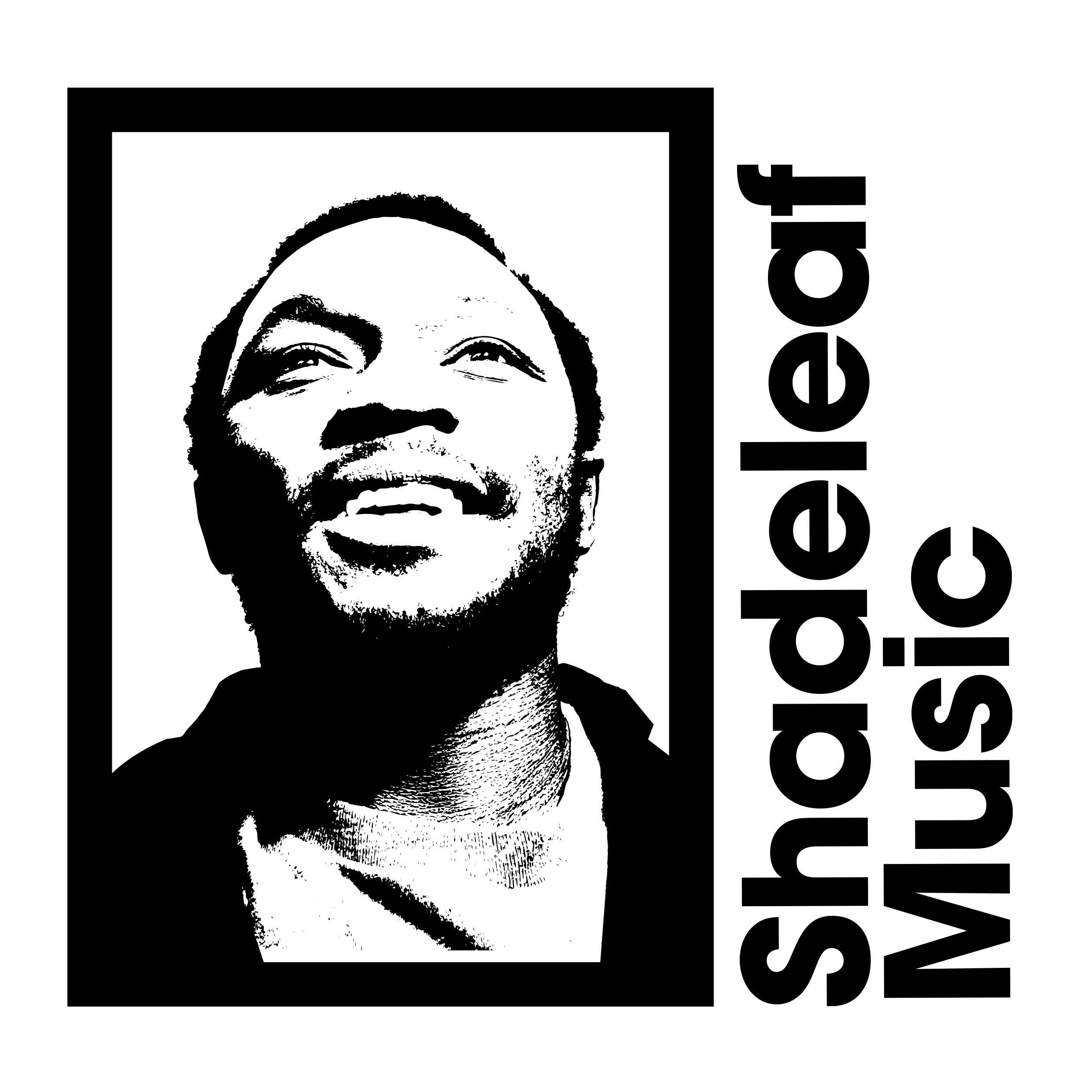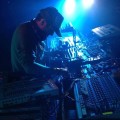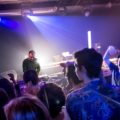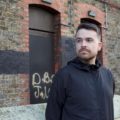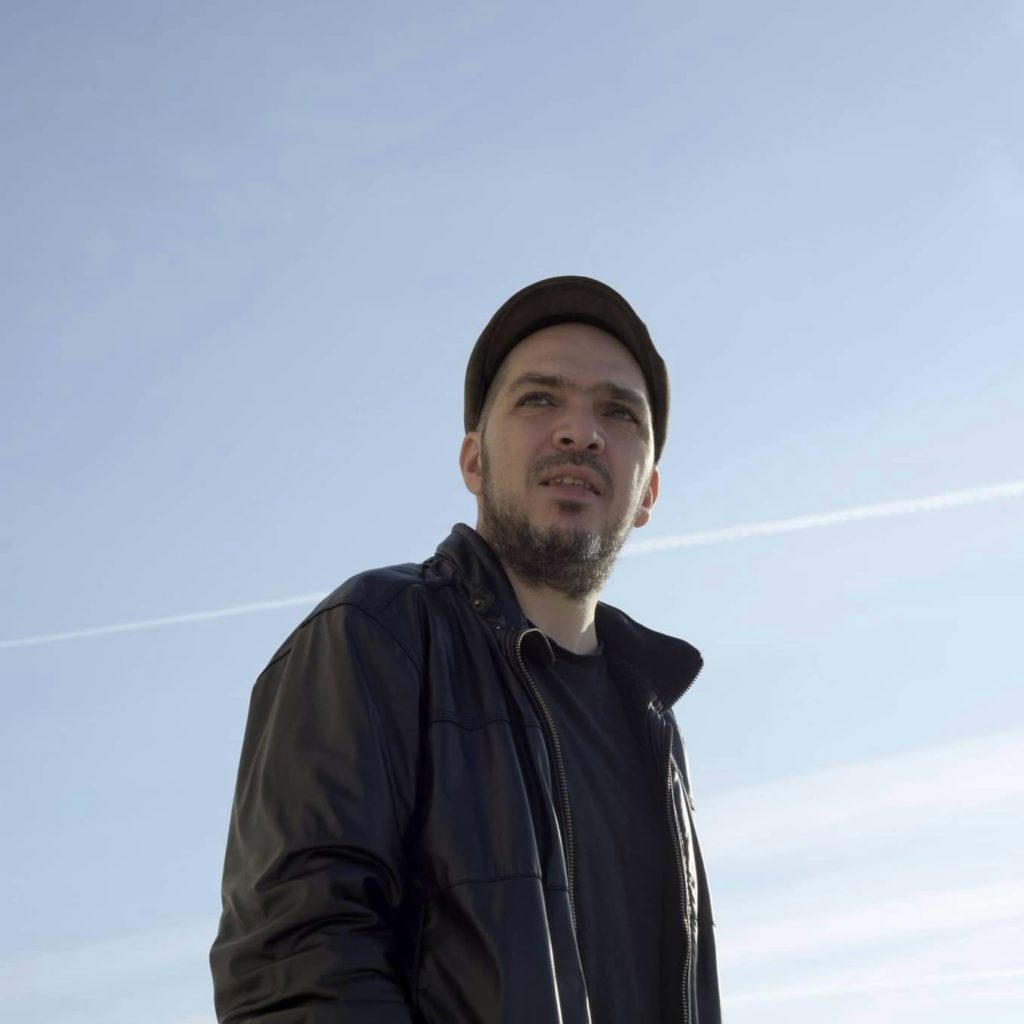
French DJ and Producer ‘Kriss’ Life Recorder in conversation
Far from following the hype or current trends, French DJ and Producer ‘Kriss’ Life Recorder has been steadily building his own sound, craft and reputation as one of Europe’s finest purveyors of deep underground electronic soul for the best part of two decades now. Forever staying close to his main inspiration that’s rooted deep in the sounds of Detroit and Chicago music culture that traverses and touches on many genres. Now based in the city of Marseille, he was born and raised in the French suburbs just outside Geneva. Where he first started to DJ and connect with the then burgeoning music scene, record shops and club culture during the 90s.
Taking his first steps into production during the early 00s, he initially focused on the Detroit Techno sound, but a few years later – things got serious after moving to Marseille. When he got his acclaimed release “No Look Back” signed to Keith Worthy’s Detroit imprint, “Aesthetic Audio”. It shone a light in a new direction and he evolved to a more deep house oriented and personal sound. It gave Kriss a new momentum and saw him create releases for the likes of Bokhari, Argumento, Grounded In Humanity, Sound Reflection and Hizou Deep Rooted.
Although his productions have taken the foreground over the past few years, his roots are steeped DJ culture and his superb ability to mix together deep house with huge atmospheric tinges of techno and bringing together territory that’s old and new. He’s had the chance to play gigs accross Europe and the Middle East locations with stops at Tresor (Berlin), Night Moves (London), Tel Aviv, Mallorca, Belgrade and Tbilisi. However, he’s still a regular in Marseille’s local scene and also works with the collective and record shop “Extend & Play”.
Trying to focus on the meaning in his music, Life Recorder keeps going where his music takes him. In 2017, he took the step to start his own label naturally called “Life Notes Recordings”: to keep pushing his own vision of music also now using the alias of “Motion Process.”
After his recent EP for Alex Attias’ Visions Inc imprint, we realised it was high time to reach out and discover more about this hugely talented artist:
Firstly: How are you doing, crazy times right?
“Not bad at the moment thank you. Crazy times indeed but good to feel the energy a little back lately. Summer vibes. Masks are disappearing outside… gathering with friends again. I played some records outdoor last week. Feeling like we’re on the good way finally but also that we must stay humble, as a new phase is starting for so many people with a new reality to deal with. Some moments were defo a bit emotional the past 12 months but I’m grateful to be here and healthy with my wife and kids: trying to stay postive and focused to move forward. Music always being a main tool.”
Tell us about your background, you’re not originally from Marseille are you?
“That’s right. I’ve been in Marseille since 2010. I was born and grew up in French Alps. 20 mins from the Swiss border and Geneva. I’ve still got my parents and most of my family there.”
How did you first get into music and what sort of things did you listen to as a youngster then?
“Well… if I dig deeper back into where it started, my mother was more into Bee Gees, disco, funk and stuff like that. Not really into French singers or variety. So the taste for warm, soulful and more dance sounds caught me early. Also, I think the 80s and early 90s music in cartoons and TV shows also influenced me. I think the main revelation was when I was 10 and a really cool teacher at my school organized some day parties for us from time to time and we could bring along some music from home. One day, a boy in my class brought a tape. It was Technotronic’s first album with all those big hits like ‘Pump up the Jam’, ‘Get up’ etc. I was like wow…this is so cool. That was a more mature sound for some 9/10 years old kids. Then, my buddy made me a copy and that was the beginning. The remix album came out with remixes by Todd Terry, Maw, David Morales (I found out who they were a bit later) and I asked my mum to buy it…It was completely new and I was hooked by the sounds. The Hip House style, the “Techno” sounds, the Chicago House styled basslines, the medleys. Those medleys with vocal samples, edits, and mixes with several tracks was really something which spoke to me. I started to listen to the radio a lot too. I got hooked on De La Soul, Monie Love, Deee Lite, Snap and stuff like that. My parents quickly gave me the old huge family stereo and I was spending hours to record everything I liked.”
When did you discover the Electronic side of sounds?
“Around 1991/92, I made myself a new friend at school who shared the same tastes and one day he came with a tape from his older sister titled “Space music”. It was a compilation of some early European Rave/Dance music. This new music was exciting and sounded big. We were searching endlessly for shows on the radio with this new sound each week and we started to create our own compilations using tape recorders. Also, we started to see a lot of compilations in stores. A French label called Fairway records specialized in releasing compilations and DJ mixes with imports from all over the world called ‘Techno Rave Party’,‘Techno Dance Party’ and so on. Those compilations exposed me to the music played in raves and clubs at that time with music from Belgium, UK, Chicago, Detroit, New York, Berlin. Then, around 94/95 I discovered the Swiss radio station ‘Couleur 3’, which had a huge impact on me. They ran a show called ‘Metissages’ every evening broadcasting news and DJ sets from around the world, as well as hosting live parties at clubs across Switzerland. The great thing about the Switzerland is that it’s so central you find a lot of connections with Italian and German sounds too. All of which have their own influences: it was a real melting pot and was so rich.”
What were your first experiences of going to parties?
“I was a bit too young to really experience the early rave parties as it was mainly happening in Paris or down South. I didn’t have much choice than to go out with my school friends to the big commercial club in our local area at first… it was outside the city. They were fun times and it was good to discover night life, but musically i was frustrated. It was around 1998/99. After a while, I reconnected with an old friend and we started to go out over the border in Switzerland to experience real underground clubs. At the time, Weetamix in Geneva was the place! A big warehouse in Geneva’s suburbs where a lot of Detroit, Chicago guys kind of had residencies. It was a dream: Carl Craig, Rolando, Derrick Carter, Stacey Pullen, Jack De Marseille were regulars there alongside the local Swiss underground DJs.”
Who were your favourite artists in those early days?
“At first it was so much about discovering all this music, all genres and those Mr Fingers, Trax or Juan Atkins classics were coming to me along the way…but quickly, the more I was into it and the 2nd and 3rd wave of Detroit/Chicago artists were taking over. What really caught me was Ron Trent, Rob Hood, Sean Deason, Alton Miller… Always somewhere between techno and house. But mainly, DJs were the heroes for me in those times. Derrick May with his skills and energy. Garnier of course… magical but Jack De Marseille was my teacher in terms of mix, technical skills, and made me discover a lot of music. Garnier had such an influence mainly for the Detroit/Chicago classic sound. Jack was on this too but also played a lot on things like UK Techno and Techouse too. Big Respect also to the UK 90s scene: Mark Broom, Ambrose, Aubrey and of course Atjazz for the deep house/broken beat side later. I’m still playing their music now.”
What led you to connect to your local music scene and start DJing?
“I don’t remember saying to myself that I needed to start DJing. I just followed the culture and mixing music was the first way to be creative and to express myself. I believe it was the same for a lot of people from my generation. I think it all started by going to record shops and being involved in the local scene really pushed me. A record shop opened in ‘99 in my local area and I quickly became a regular. I did an internship during school there. Then, I played my first ever set in public with the crew in a small club. I was totally hooked by the feeling and got some great feedback. Then my 2nd gig came, I got booked to open before a St Germain concert in 2001 and I’ve never stopped since. It was early 2000’s and the beggining of a new era with music and the internet, the first online forums opened where you could upload mixes and get heard more easily – worldwide! Also at that time in Switzerland, the Loft club in Lausanne was one of the best spots for electronic music in Europe. They held a DJ contest fora few years and I got selected to play there for the first time.”
And what made you decide to relocate to Marseille?
“Life changes. I got married and my wife had family in Marseille. We had an opportunity to move there and we did it.”
Is there much of an electronic music community there today (before COVID hit)?
“Sure. The electronic music community in Marseille has been alive and kicking since the 90s. There are some important figures still active today with a huge following. Sadly this year we lost one of the most important figures with the passing of our friend Seb Bromberger from Modelisme Records. It’s been a huge loss for the scene here. Modelisme was active since 2001 and one of the first labels from Marseille, creating connections with Detroit and the worldwide scene throughout the years. Music life here will miss him. By the way, there was a real down period during the 00s in Marseille but things came back and I think the city had one of its most prolific time between 2013-2018. Glad I was a bit part of it! Sadly it was already starting to slow down in 2019 before Covid hit with some important clubs closing down. Now, le’ts see how it will turn out. There’s not many clubs and spaces left for a not so big community… but the positive thing also is to see that the public is way more educated and open musically here after the past few years. The scene here has some new talented DJs and labels bubbling under with some good energy. More record shops are opening following the opening of ‘Extend & Play’, which is now a key spot here since 2015.”
And how does it compare to say Lyon or Paris?
“Marseille is Marseille. It’s hard to compare to anywhere else. Marseille has its way of life. Its spirit, its own culture… Mediterranean life can be slow, it can be raw. The city can be very inspirational but some things can be very ephemeral. Some people are feeling it. Some people hate it. You have to be ready to adapt. Timeline from UR did a track called ‘Moment in Marseille’ after a gig here. They caught the spirit of the city pretty well. We have some magical views and spots and people love to spend a moment here for a while and enjoy the vibe. You don’t really come to Marseille for the renowned and constant club culture or night life like it can be in Paris… well that was the case before Covid. Now like I said, let’s see how it goes for everyone.”
When you got into producing, what was the first bit of equipment you bought?
“I started to play around with an Akai ms 20 sampler and then I bought an MC 303 Groovebox. To be honest, I really started to create tracks with this. I still have a tape I think somewhere.”
And how has your studio evolved since ….
“I sold everything one day because I wanted to buy more records at that time! I felt the production side calling me but DJing was still more important for me. One day a friend gave me a copy of Reason software, Reason 3.5 i think and i just got hooked. I bought a midi keyboard and never really went back to hardware since. Funny, because some people or even other producers I know wrote to me to ask for my advice about hardware and they’re surprised when I say I work in the box with software… So, I say to myself I must be doing something right 🙂 I think the best hardware is yourself!”
How do you feel when you listen back to your earlier productions now?
“There are a few tracks from recent years that I can listen to with a free mind. That’s a good thing but as someone who always tries to catch the mood of the moment in my music, older prods can definitely be hard to listen. Especially those before my Aesthetic Audio release, which was really a new phase in my music. I was younger and searching myself and sometimes rushing things. But at the end I’m always searching something, I think it’s part of the game and evolution and the story of an artist. Sometimes we stress, but we learn how to let things go. Now, I really try to distance myself from some things that will make me think too much. Trying to work on new tracks or a new release like it was the first one. I’m always trying to find that fresh vibe and am glad to feel more confidence with time and my latest releases.”
What’s the biggest lesson you’ve learned in terms of making and shaping sounds?
“Stay true. Trust your first feelings and inspiration. If it sounds good to you the first time, why overthink it? The best tracks are often made in one or 2 days… also remember – less is often the better option.”
Do you have any particular rules you follow or do you just go with the flow?
“Mainly going with the flow. You can start from an atmosphere or a simple rhythmic pattern
What projects are you working on at the moment?
“I’m currently finishing the next release for my label Life Notes. It’s taking time. I had to step back from a previous EP I was thinking about putting out but I wasn’t happy enough. Often, I haven’t been in the mood lately. So now, I’m taking the time to be really happy with what I want to put out. With all the time it takes to press records lately, it’ll be a release for next year. Maybe I’ll sneak a digi EP in between. Besides that, I have my online show “Resilience” every month on Nowhere Radio.”
And what have you got coming out next?
“The next thing to come out is a remix I did for Aleqs Notal. It’s scheduled to come out on Chubby records in August in a pretty nice 2x 12″ pack.”

